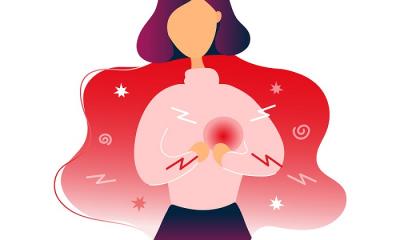
Image source: Adobe Stock/LIGHTFIELD STUDIOS
News • Menopause research
Hot flashes: a hazard for the heart?
It's estimated that upward of 70% of women experience hot flashes sometime during the menopause transition. Although it has long been accepted that hot flashes can affect mental health and quality of life, accumulating research suggests a link between them and cardiovascular disease risk in women.
A presentation at The North American Menopause Society (NAMS) Annual Meeting in Atlanta, highlights concerns linking hot flashes with heart health.
Cardiovascular disease is the leading cause of death in women, with the risk accelerating in midlife during the menopause transition. Large epidemiologic cohort studies, as well as clinical studies using physiologic assessments of vasomotor symptoms, have produced evidence linking hot flashes and risk of heart disease.
Accumulating research [...] underscores that frequent or severe hot flashes may signal women who are at increased cardiovascular disease risk at midlife and beyond
Rebecca Thurston
Specifically, women with more frequent hot flashes have poorer cardiovascular risk factor profiles, including elevated blood pressure (or hypertension), insulin resistance (or diabetes), and dyslipidemia, as well a greater risk of underlying atherosclerosis. More frequent or persistent hot flashes have additionally been linked with a greater risk of cardiovascular disease events such as myocardial infarction and stroke as women age. Newer research has also linked vasomotor symptoms to indicators of brain health, including markers of small vessel disease in the brain.
Dr. Rebecca Thurston from the University of Pittsburgh, who leads the presentation that explores potential underlying physiologic mechanisms that may link vasomotor symptoms to cardiovascular risk, as well as the clinical implications of this work, says: "Hot flashes are regarded as symptoms with implications for quality of life but not necessarily physical health. Accumulating research has called this long-held clinical wisdom into question and underscores that frequent or severe hot flashes may signal women who are at increased cardiovascular disease risk at midlife and beyond,"
"This presentation will introduce the latest thinking about how women with a high burden of vasomotor symptoms may particularly benefit from targeted cardiovascular reduction efforts as they age," says Dr. Faubion, NAMS medical director.
Source: The North American Menopause Society
13.10.2022











